If you’ve never heard of, much less tried to make, a fougasse then let me just say that you are in for a multi-dimensional surprise.
First of all, it’s like the no-fail-anyone-can-do-it focaccia in that it’s super easy. I think this bread actually even tastes better if you add in a little kid-chaos to the mix.
It’s fun to have this on the table at a family event because you just pull off what you want. My grandson, Patrick (who’s 7), really loved that idea. When we added a little dish of tomato sauce for him to dip in, I think we outranked any visit he’d ever had to Pizza Hut.
In my last post Revamping Recipes, Revamping Life I gave a bit of the history for the primitive hearth bread called fougasse. In a practical sense, many Mediterranean cultures used big wood fired hearths for baking so it follows that in the absence of a good digital thermometer they’d need something to determine oven readiness. These hearth breads fit the bill. The Romans had focaccia. The Spanish had hogaza. The roots of fougasse can be found in the Provence area of France.
This is pretty versatile so you can put your own flair on it. It’s traditional to add olives (green and black) to it. You can also try adding anything from sun-dried tomatoes to whatever herbs you happen to have on hand. Slather it in some garlic infused olive oil and you may just end up eating the entire fougasse before anyone even knows its gone missing.
This week I did one batch of dough then divided it in two. I added herbs to one part. To the other part I added raisins and cinnamon. Both were a hit. The cinnamon-raisin fougasse was somewhat of a cross between a bagel and a sweet roll. I couldn’t resist stirring up a little vanilla glaze for dipping. I’m already thinking about cranberry-orange for next time!
Tempted? There’s nothing to do but roll up your sleeves, call in the troops, and get started!
Fougasse
3 1/2 cups all purpose flour (you can substitute in bread flour or a little wheat flour)
1 1/2 tsp active dry yeast
3/4 tsp salt
1 1/4 cups room temperature water
a “medium” glog of olive oil (…so about 2 Tablespoons)
Directions:
Mix all ingredients till combined. Knead it until smooth and supple (about 8 minutes) or take the slow, lazier route, skip the kneading and just do the folding method I used in the Focaccia directions.
After you’ve kneaded (or folded the 4 times) you can divide
your dough in half and knead in a few extras. I used 1/2 cup of raisins and about a teaspoon and a half of cinnamon in one half. The other I left plain and decided to just sprinkle with herbs and olive oil when it was baking time.
Allow the dough to rest, covered until doubled in size.
“Why does the dough have to be covered?” you might ask. The answer is two fold. Yeast loves a moist, humid environment which covering helps create. Secondly, if the dough dries out on top, the yeast doesn’t keep working well. You can contemplate this while your dough rests. Should be a quick contemplation so why not take the rest of the time to contemplate other, more important things, in your life while you have a little time.
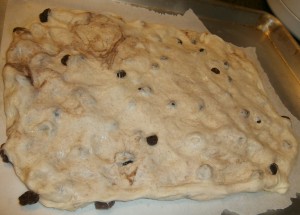 When the dough has risen, line your baking sheet(s) with parchment paper and rub it with a little olive oil (if you don’t have parchment, just oil the pan). Stretch the dough. I like the Goldilocks stretch here: not too thin, not too thick,…just right.
When the dough has risen, line your baking sheet(s) with parchment paper and rub it with a little olive oil (if you don’t have parchment, just oil the pan). Stretch the dough. I like the Goldilocks stretch here: not too thin, not too thick,…just right.
Let is rest again; this time about 15 -20 minutes.
At this point, I gently rubbed on a little olive oil on the top of each fougasse. To the plain one I added herbs de Provence (it seemed the honorable thing to do being this hearth bread originated in Provence) and some sea salt. To the cinnamon-raisin fougasse I sprinkled on a good dose of yum (well, cinnamon-sugar).
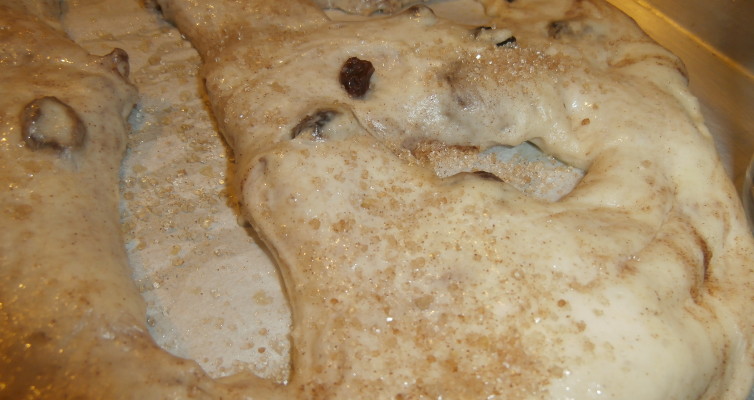 Bake at 425 degrees for about 20 minutes or until golden brown. While they’re cooking make some herbed oil, get out a little tomato sauce or
Bake at 425 degrees for about 20 minutes or until golden brown. While they’re cooking make some herbed oil, get out a little tomato sauce or 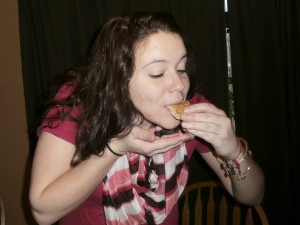 melt some cheese for dipping the herbed fougasse. Stir up a little vanilla glaze for the sweet one. Expect this to disappear quickly.
melt some cheese for dipping the herbed fougasse. Stir up a little vanilla glaze for the sweet one. Expect this to disappear quickly.
The leftovers are great for breakfast if it’s a sweet fougasse or to soak up broth in a soup or stew if it’s herbed. I’m getting hungry again just thinking about it! Enjoy!
Mary
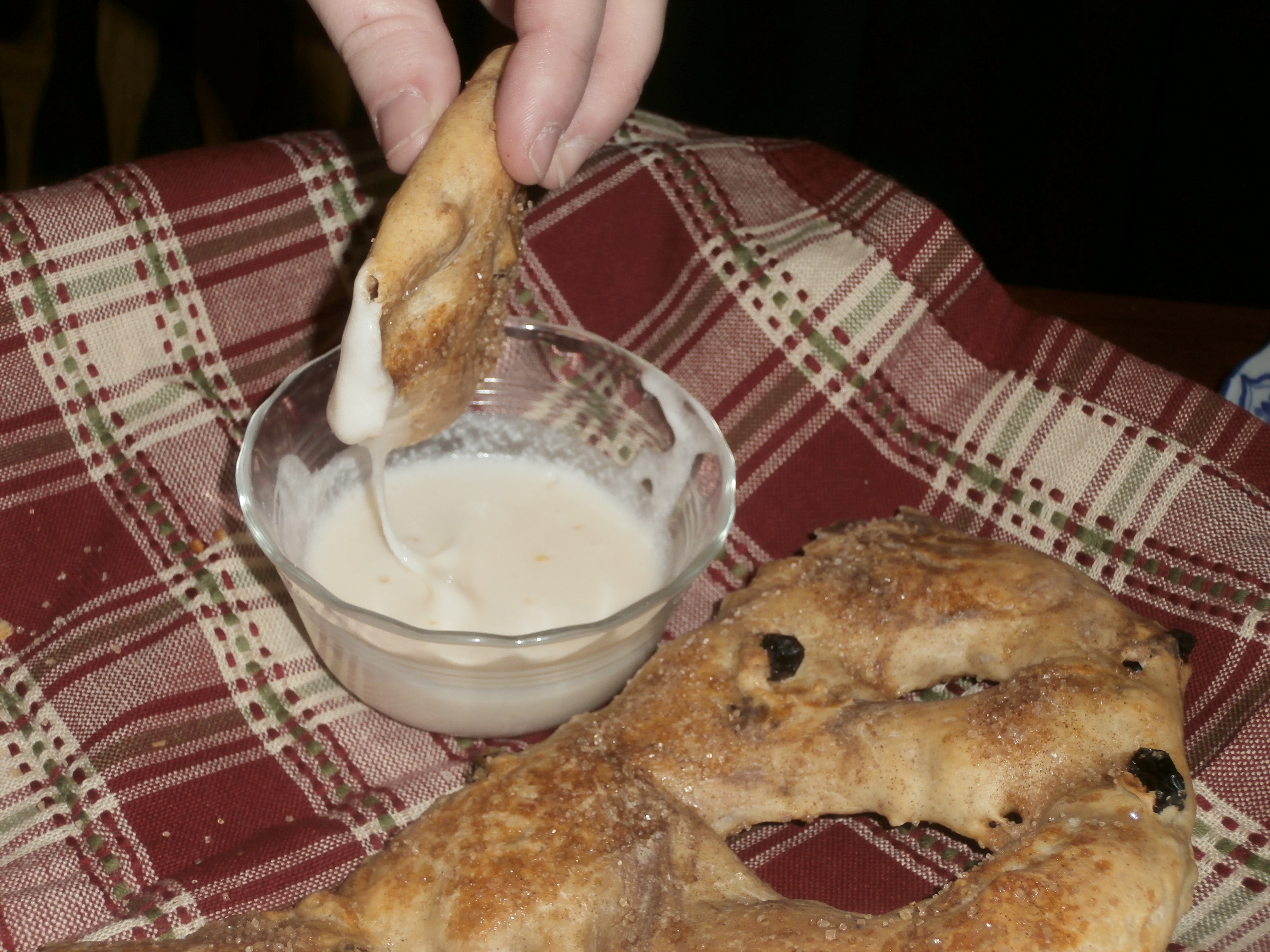
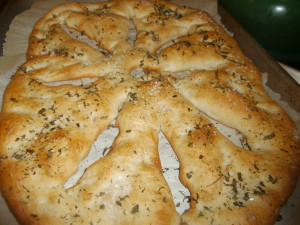
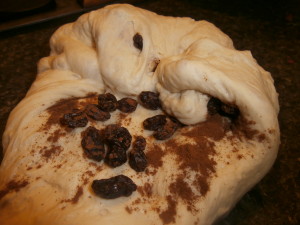
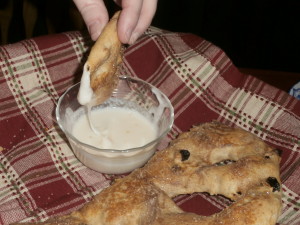

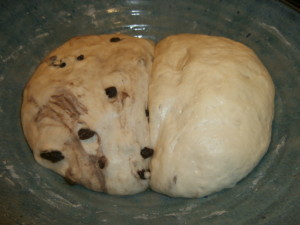
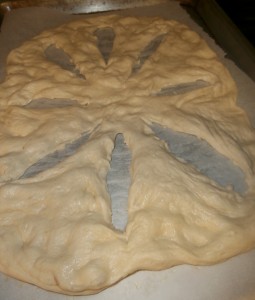
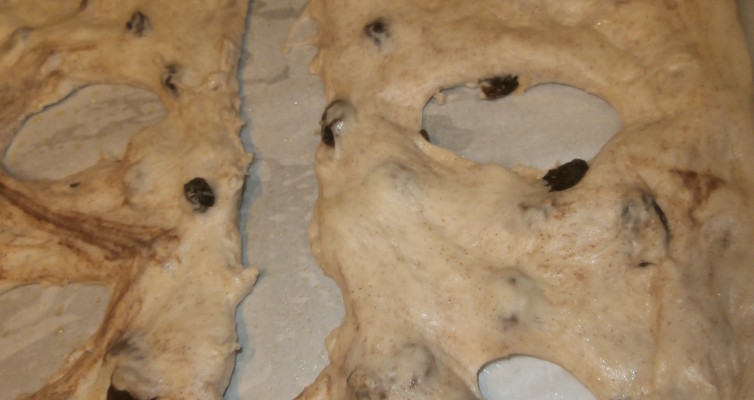

What’s the recipe for the vanilla glaze?